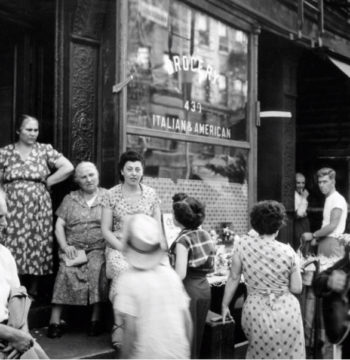by Andrea Scrima (excerpt from a work-in-progress)
 My father, the son of Italian immigrants, was a member of the working class. There were things within reach, and things that were not in reach, and he accepted this. He never pushed his children to broaden their horizons, and would have been satisfied to see them in traditional working-class vocations. When I came home from school eager to show off my grades, he poked fun at me. The prospect of pursuing an intellectual career was alien to him; in his view, taking out student loans to go to college or university was a way for banks to trap the “little guy.” When I presented him with the papers, he refused to sign. There was no discussion. I eventually moved out and managed to get my BFA anyway, and when I wound up as a finalist for a Fulbright, the doctor who performed the general checkup required by the awarding commission—I was still covered by my father’s Blue Cross plan, but only because I was still technically a dependent and it didn’t cost him anything—took him aside and told him that a Fulbright would be “quite a feather in your daughter’s cap.”
My father, the son of Italian immigrants, was a member of the working class. There were things within reach, and things that were not in reach, and he accepted this. He never pushed his children to broaden their horizons, and would have been satisfied to see them in traditional working-class vocations. When I came home from school eager to show off my grades, he poked fun at me. The prospect of pursuing an intellectual career was alien to him; in his view, taking out student loans to go to college or university was a way for banks to trap the “little guy.” When I presented him with the papers, he refused to sign. There was no discussion. I eventually moved out and managed to get my BFA anyway, and when I wound up as a finalist for a Fulbright, the doctor who performed the general checkup required by the awarding commission—I was still covered by my father’s Blue Cross plan, but only because I was still technically a dependent and it didn’t cost him anything—took him aside and told him that a Fulbright would be “quite a feather in your daughter’s cap.”
He must have sensed something. My father mistrusted doctors, all of whom were crooks, and while he relayed the remark to me later, it didn’t seem to have made much of an impression on him. As it turned out, I didn’t receive the Fulbright; a short time later, when I won an equivalent scholarship from a German foundation to attend graduate school in Berlin, he threw me a skeptical look. To his mind, a stipend amounted to charity. It was like getting welfare, and because no self-respecting American would ever stoop so low, I was evidently on the wrong path. He’d already invented a new nickname for me when I moved out: “Wayward,” which neatly captured the moral deviance of a young woman leaving her parents’ home for any reason other than marriage. Yet for all his subtle mockery, I knew that he loved me and that I’d hurt him; now that I’d decided to strike it out on my own in a foreign country, I was leaving behind everything he’d ever known. Read more »
